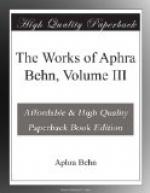And canting Nadab let oblivion
damn,
Who made new porridge for
the paschal lamb.
cf. also Absalom’s IX Worthies:—
Then prophane Nadab, that
hates all sacred things,
And on that score abominateth
kings;
With Mahomet wine he damneth,
with intent
To erect his Paschal-lamb’s-wool-Sacrament.
A ballad on the Rye House Plot, entitled The Conspiracy; or, The Discovery of the Fanatic Plot, sings:—
Next valiant and noble Lord
Howard,
That formerly
dealt in lamb’s wool;
Who knowing what it is to
be towered,
By impeaching
may fill the jails full.
p. 100 Brumighams. Bromingham was a slang term of the day for a Whig. Roger North says that the Tories nicknamed the opposite party ’Birmingham Protestants, alluding to the false groats struck at that place’. Birmingham was already noted for spurious coinage. cf. Dryden’s prologue to The Spanish Friar (1681):—
What
e’er base metal come
You coin as fast as groats
at Bromingam.
A panegyric on the return of the Duke and Duchess of York from Scotland says of Shaftesbury’s medal that
’Twas coined by stealth, like groats at Birmingham.
For Birmingham = Whig we have Old Jemmy, an Excellent New Ballad:
Let Whig and Bromingham repine,
They show their teeth in vain;
The glory of the British line,
Old Jemmy’s come again.
Also in Matthew Taubman’s A Medley on the Plot, this stanza occurs:—
Confound the hypocrites, Birminghams
royal,
Who think allegiance
a transgression;
Since to oppose the King is
counted loyal,
And to rail high
at the succession.
Dryden in his Preface to Absalom and Achitophel, I, speaks of ’an Anti-Bromingham’, i.e. a Tory.
p. 100 dry bobs. A bob was a sarcastic jest or jibe. cf. Sir Giles Goosecappe (1606), Act. v, I. ’Marry him, sweet Lady, to answere his bitter Bob,’ and Buckingham’s The Rehearsal (1671), Act iii, I, where Bayes cries: ‘There’s a bob for the Court.’ A dry bob (literally = a blow or fillip that does not break the skin) is an intensely bitter taunt, cf. Cotgrave (1611), Ruade seiche, a drie bob, jeast or nip. Bailey (1731) has ‘Dry Bob. a Taunt or Scoff’.
p. 100 By Yea and Nay. ‘Yea and Nay’ was often derisively applied to the Puritans, and hence to their lineal descendants the Whigs, in allusion to the Scriptural injunction, S. Matthew v, 33-7, which they feigned exactly to follow. Timothy Thin-beard, a rascally Puritan, in Heywood’s If you Know Not Me, You Know Nobody, Part II (4to, 1606), is continually asseverating ‘By yea and nay’, cf. Fletcher’s Monsieur Thomas, Act ii, III, where Thomas says:—
Do not ye see me alter’d?
‘Yea and Nay,’ gentlemen;
A much-converted man.




